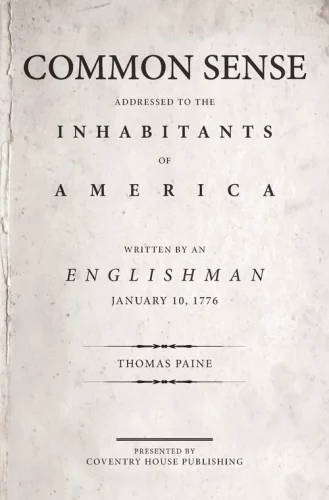“Common Sense” by Thomas Paine was the most important literary document during the American revolutionary period. It is maybe even the most important literary document in American history. When it was published, it was read by almost the entire white adult population of the colonies. If someone didn’t read it, they listened to it read aloud. Almost everyone was familiar with it. It was the primary factor that spurred most people to side with the revolutionaries. It allowed the revolution to gain popular support. Why was “Common Sense” incredibly influential? What made it so persuasive? One thing is for certain, it was not the logic of it.
Poor Logic
The logic of the arguments in “Common Sense” does not hold up to scrutiny. Many of them are simply wrong or misrepresentations of what is true. For example Paine writes: “I have never met with a man, either in England or America, who hath not confessed his opinion that a separation between the countries, would take place one time or other: And there is no instance, in which we have shewn less judgement, than in endeavouring to describe, what we call the ripeness or fitness of the Continent for independence.” Here Paine is claiming that every man he has met, either in England or America, was in favor of independence. This is obviously preposterous.
It is well known that there were loyalists or Tories in the American colonies. There was a great debate going on between the people in favor of independence and those in favor of reconciliation. The purpose of “Common Sense” was literally to persuade people to support independence. During the Revolutionary War when the British invaded the South, there was a mini civil war between the Patriots and the Tories. Both sides inflicting atrocities on the other. There was always a divide between colonists in favor of independence and those in favor of reconciliation. Paine claiming that literally everyone he met was in favor of independence made no sense.
Paine also writes that commerce weakens a nation militarily and he claims Britain has fallen into this situation. He writes: “It is a matter worthy of observation, that the more a country is peopled, the smaller their armies are. In military numbers, the ancients far exceeded the moderns: and the reason is evident. For trade being the consequence of population, men become too much absorbed thereby to attend to anything else. Commerce diminishes the spirit, both of patriotism and military defence. And history sufficiently informs us, that the bravest achievements were always accomplished in the non-age of a nation. With the increase of commerce, England hath lost its spirit.” Is this true? Had England really lost its “spirit?”
Commerce doesn’t weaken a nation; trade and the division of labor don’t weaken nations and Britain is a perfect example of this. Paine claims Britain had lost its spirit. However, it doesn’t look like Britain lost its spirit to me. They had the most effective navy in the world and one of the best armies. They were fighting a war across an ocean. The Americans had a very difficult time against the British army; they lost most major engagements. They were only able to prevail because of the militia’s guerrilla tactics. Washington only had to prevent the Continental Army from being destroyed to win the war. He was more of an icon than general, but I digress. Napoleon claimed the same thing: That Britain was just a insignificant nation of shopkeepers. But, he learned first-hand when he lost at the battle of Waterloo that Britain, the nation of shopkeepers, could fight. The bottom line is this: Commerce doesn’t weaken a nation and it was silly for Paine to claim it did.
Great Rhetoric
So, what made “Common Sense” so persuasive? It definitely was not the logic. Most of the pamphlet’s logic was akin to the examples above. It simply was untrue. What made “Common Sense” influential was its rhetoric. Paine was a master of persuasive writing. He was able to write in a way where people believed him even though his arguments made no sense. History proves this; his pamphlet was massively influential. This goes to show how the masses are not moved by logic. Master rhetoric and you can make someone believe anything. Well, not really, but you get my point.
Conclusion
“Common Sense” was the most important pamphlet of the revolutionary period. It was incredibly influential and swayed public opinion in favor of the revolution. However, its logic was not what made it persuasive. The logic of the arguments was very poor and in most cases easily refutable. Its influence came from its rhetoric. It was persuasive, but not logical. You could say “Common Sense” did not have much common sense.

Leave a Reply